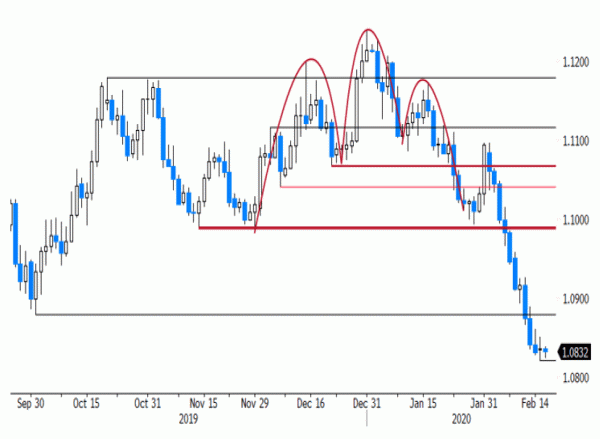Rates: Belgium to launch 20-yr OLO via syndication
The Kingdom of Belgium will issue its 2nd syndicated OLO this year (Jun2040) following the successful €6bn 10-yr deal (Jun2030) mid-January. Risk sentiment is spoiled this morning by Apple’s coronavirus related Q1 revenue warning. Adding downside risks to German ZEW readings suggests core bonds could be in demand today.
Currencies: ZEW to cause more pain for the euro?
Yesterday, EUR/USD hovered near a 3-year low in technical trading. Today’s eco data (German ZEW and US Empire Manufacturing) may illustrate the divergence between US and EMU economy. If so, it won’t help to block the euro decline. In the UK, the labour data kick off a week with plenty of important UK data. Will EUR/GBP revisit the 0.8276 support?
The Sunrise Headlines
- WS was closed yesterday for President’s Day. Asian markets are colouring red as the coronavirus outbreak is taking its toll on corporate earnings amid slowing production and weaker demand. Japan underperforms (-1.51%).
- China released a list of 696 US products including key agricultural and energy products (e.g. pork, beef, crude oil, etc.) that would be exempted from punitive tariffs as part of the phase one trade agreement.
- The BoJ is no longer inclined to pursue its ambitious 2% inflation target, Reuters reported. Instead, the BoJ’s policy has now shifted toward keeping the economy on a sustainable recovery path amid intensifying (global) pressures.
- Japan’s finance minister Taro Aso announced his ministry is keeping an eye on the spreading coronavirus outbreak and its impact on the economy. Aso ensured that fiscal policy steps would be taken as needed.
- UK’s chief Brexit negotiator launched an attack on the EU’s conditions for a post-Brexit trade deal saying the UK will never accept them. David Frost claims the UK should have the freedom to diverge from EU rules and regulations.
- RBA minutes show it contemplated a rate-cut this month but voted against it to avoid climbing house prices. The RBA expects rates to remain low for “an extended period” yet retains a positive view of the economy’s prospects.
- In today’s economic calendar we keep an eye on the German ZEW investor survey, UK employment figures and the US Empire Manufacturing index. Germany taps the bond market and Belgium launches a new 20-yr OLO
Currencies: ZEW To Cause More Pain For The Euro?
ZEW to cause more pain for the euro ?
On Monday, global (FX) markets experienced a lacklustre session. US markets were closed and there were no key EMU data. China (and the yuan) initially held a constructive bias as the PBOC provided cheap money and the government prepared (selective) fiscal support to ease the impact of corona. However, the positive spill-over to Europe and the rest of the world was modest. EUR/USD held a tight sideways range near recent lows and closed at 1.0836. USD/JPY kept a cautious intraday uptrend but again failed to regain the 110 barrier. (close 109.88).
This morning, the market assessment on corona turned again ‘negative’ after Apple indicated it doesn’t expect to meet its revenue guidance as production and demand of iPhones are negatively impacted by corona. The yuan weakens close to USD/CNY 7.00. The yen strengthens slightly (USD/JPY 109.75 area). EUR/USD again tested the 1.0825 area, but for now a new down-leg is avoided. The Aussie dollar again dropped below the 0.67 barrier. The minutes of the February RBA meeting are seen as rather soft as the bank discussed the pros and cons of further easing.
In Europe, ZEW investor confidence will be closely monitored. A sharp deterioration in confidence due to the impact of corona might weigh further on the euro. The US Empire Manufacturing index is expected little changed. Today’s data may confirm the divergence in economic performance between Europe and the US. This shouldn’t be a big surprise. Even so, it won’t help the euro.
The EUR/USD technical picture deteriorated substantially after breaking subsequent supports, including the 1.0879 2019 low. 1.0778 is the next reference (2017 gap). The pair is moving into oversold territory, but this factor alone is unlikely to trigger a rebound. A rise above the 1.0900 area would be a first tentative sign that pressure might be easing.
On Monday, sterling fell prey to modest profit taking. There were few important UK data. Sterling traders focused more on the highly divergent positions of the EU and the UK at the start of the trade negotiations. Today, the UK labour data will be published. Job growth is expected to slow to a still solid 148 k (3M/3M). UK eco data recently showed signs of improvement. However, the labour market is a lagging indicator and last month’s report was strong. So, a positive, sterling supportive outcome maybe isn’t that evident for this series. Still we keep a sterling constructive bias going into the eco data later this week.
EUR/USD: euro holding near lowest level in 3 year

